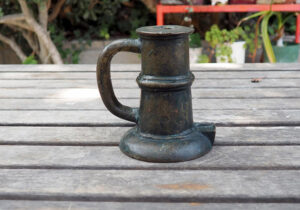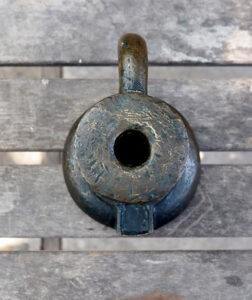
LY, a quite proper frequent reader, surprised me. He sent a recent purchase of a thunder mug. Educated in Britain, I remembered the term for the chamber pot as the “thunder mug,” I asked LY, ever courteous, “is this for hygiene purposes?”
He replied no, ships used them for signaling and celebration. Very different from 19th century chamber pots, in no way used for celebration. Although my son used one of my collectible chamber pots for his popcorn at movie night. So you understand my surprise.
What is a Thunder Mug?
My first British dorm room did not include plumbing. At night we used chamber pots because the outhouse seemed distant in cold Scotland. We called them thunder mugs in the all-girl’s dorm back in the early 1980s. LY said ships used thunder mugs as early as the 15th through 19th century. He’s found three of them in flea markets in Ventura.
In the old days if a captain saw another ship and didn’t recognize her, he fired this small canons, the size of a beer mug. The other ship answered. They did this without displaying the large cannons on the sides of the ships, not to seem threatening. The poor first mate who lit these little powerful weapons and sounded them stood in danger of losing sight and hearing.
Not for Bathroom Use

I learn something new from my clients everyday. LY collected three of these, as mentioned, and not for hygiene, but for the historical significance.
“Elizabeth,” he wrote. “The term thunder mug also became known as a chamber pot later thanks to the deviant male humor of a random seafaring man.” Oh, how true about deviant male bathroom humor….
Lit with black powder, highly flammable, and, in such a compressed device, sounded exceeding loud. Because this black powder needed testing for moisture while at sea, these served as testing canon as well.
The “mug” reference refers to its shape, beakers with handles, made from iron or brass. They inserted power through a lip at the bottom. We see an open hole (touch hole) at the top.
Timely Part to My Thunder Mug Story
In the 15th and 16th century a ship needed to prove they didn’t carry the Black Death when coming to port. These little thunder mugs signaled that the ship was ready for inspection.
An article by John Morris, date unknown, published in the “Springfield Arsenal Files” tells of a beer mug that sounds like a Howitzer. In France, they called it a boite, in Spain, a servadore, and in the USA not used much at all. But, fired, in England, as called a “chamber,” and in later years used in the “1812 Overture” at British Symphony halls.
Morris’ article mentions the inventory from the Tower of London in 1568, where the Tower held 24 of these thunder mugs for the purposes of “chambers for triumphs (sic)…” and crafted in the higher material than iron, bronze, to be sounded for victories earned. If you ever wondered about the big boom at the end of a firework display, this is where it came from: the Thunder Mug, the herald of triumph.
In England in the 16th century they were used for the conclusion of a fireworks display. Whomever used them did so with extreme care as they might lose ears and eyes, not to mention hands. Modern collectors are urged not to light these little canons at all.
But collectible, at about $1,000 a piece; because most people do not know what the heck they are, they might be thinking, like me, they were used for ‘passing water’ (if you are male), or, conversely, they are a converted beer mug. Many thanks to LY for sending me such an interesting form.
This one’s a real jaw dropper …. End of fireworks IG boom history. Oh Elizabeth I love your words of wit and wisdom
Ignore the IG pls remove if you can… unknown to me – small keyboard mistake